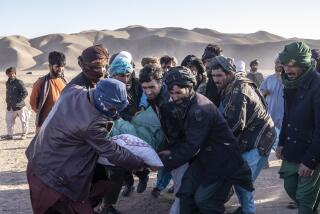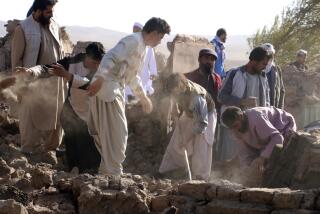In Afghans’ Capital, Images of Life and Death : Asia: An Islamic coalition strives to bring order out of chaos while the fighting continues to take a toll.
- Share via
KABUL, Afghanistan — Samir died at 1 p.m. with rocket shrapnel in his head. He was in Bed No. 2 in the children’s ward of Kabul’s Indira Gandhi Hospital. But it hardly mattered that there was no oxygen on hand to save the 6-year-old boy. The hospital had no power, no medicine, no water and not even food for the half-dozen other children dying in the cots beside him.
A few hours before, and several blocks away, another Afghan died a more dramatic death. Several tribal militiamen who shot their way into the city’s Interior Ministry overnight found a man, suspected of being a former secret police agent, under a blanket as they looted the minister’s office, a stronghold of a rival rebel faction in the struggle for power.
They beat him with their rifle butts, tied his hands with their scarves and led him to the driveway, where they shot him 10 times.
His body was dragged off to the side and covered with a white sheet, left forgotten throughout the day.
These were among the images of life and death here Wednesday in the city that was the ultimate prize of war, now the capital of Afghanistan’s new Islamic coalition government on its first official day in power.
The fierce three-day battle for Kabul had allowed moderate guerrilla factions to install President Sibghatullah Mojaddidi on Tuesday, after the fallen Communist regime finally ceded power to a wide array of Islamic rebel forces. But the fundamentalist rebels who oppose the Muslim scholar and his new coalition were still rocketing the capital from distant positions day and night.
The new leadership is anything but firmly installed. During a briefing at Kabul’s new center of power, Mojaddidi had to apologize to diplomats from two dozen nations that he could not offer them even a cup of tea.
For many here, these are all images of the challenges facing this fragile new regime, reflecting the devastation and deep divisions of a nation nearly 14 years at war. For others, they are omens that the new government of guerrilla warriors, brave in the mountains but lost in the city, lacks the skills necessary to rebuild.
Amid the chaos that has left the entire city of 1.5 million people without power and water and with little food and fuel, there were other images of hope.
Mojaddidi, a revered Muslim figure, and his 50-member interim council held emergency sessions to strengthen the new government and bring the capital back to life.
Braving the rockets, Pakistan’s Prime Minister Nawaz Sharif flew into Kabul to bolster the image of the new regime, the first visit from a head of state whose country had long backed the guerrilla hard-liners now opposing the coalition’s rule.
Although the Kabul airport was crippled by a power failure, a plane carrying Sharif and a high-powered delegation from Saudi Arabia managed to land, and their convoy of black limousines sped through streets now controlled by a new army of bearded Muslim guerrillas from several factions.
In a press conference, Sharif heartily congratulated Kabul’s new leaders, pledging full support and aid in a statement that strengthened Mojaddidi’s hand against the fundamentalists.
There was an unconfirmed report of a more important arrival in the capital Wednesday. The Associated Press, quoting American journalist Richard Mackenzie, said that Ahmed Shah Masoud, the most powerful guerrilla commander in the country, arrived unannounced late in the day with 10,000 troops to help impose order.
Masoud drove after nightfall to the headquarters of the Kabul garrison, responsible for the capital’s security, said Mackenzie, who accompanied the convoy of Masoud’s moujahedeen fighters.
Masoud had said he would enter the city only after a new Islamic government is in place, a condition met Tuesday with the formal transfer of power to Mojaddidi.
The new president is to govern for two months, then turn over power for four months to Burhanuddin Rabbani, political leader of Masoud’s Jamaat-i-Islami party, the main force behind Mojaddidi. A council is then to choose an interim government to oversee elections.
Seeking further support, Mojaddidi reassuringly briefed the diplomatic corps, speaking firmly and in fluent English about installing a gentle form of Islamic social justice. He reminded the handful of ambassadors still in Kabul of the millions of widows, orphans and handicapped left by the years of conflict. And, pledging friendship to the many nations in the Middle East, Europe and North America that supported the rebels’ cause, he appealed for help and understanding as Afghans attempt to rebuild.
Just an hour or so after the suspected secret police agent was executed by the tribal militiamen--a group allied with the Muslim guerrilla factions that dominate the new coalition--President Mojaddidi made it clear that such incidents will end in time.
“This is not the time of killing. This is not the time of torture. This is not the time of imprisoning people,” he said. “This is the time for friendship, brotherhood and coexistence.”
The new government has promised amnesty to all Afghans except the ousted President Najibullah, who remains in hiding.
Meanwhile, in a compound where Mojaddidi’s council was calling in former generals and regime officials to find ways to repair the capital, a senior member of Masoud’s Jamaat-i-Islami party pledged that the transition period will be short.
“Now that we were able to get the victory, I am sure we will be able to rebuild,” said Mohammed Yasser.
As an example of the work under way, an aide to Mojaddidi said that a general of the old regime has been appointed to restore electrical power to the capital.
When evening came, however, Kabul was still without power. And for most of the city, Wednesday was a time not of rebuilding but of pain--mixed with some hope.
Seated between the hospital bed where Samir had died and that of his own son Nangyalai, Sayed Bodshah quietly wept as he watched his 10-year-old writhe from his shrapnel injury.
“We have no food. We have no water. We have no clothes even to wear,” he said, “And they’re fighting. Enough!”
Fawzia, the mother of another boy wounded in the war of the rockets, approached in a near rage.
“If they want fighting, if they want war, fine. They can go into the fields and fight. If they are men, if they are brave, they can fight like men--not hiding in the houses and killing women and children.”
Her anger subsided as she stroked her wounded son’s face. “Sometimes I think Afghanistan is finished. If everybody dies, if all our sons are gone, who will live in our country?”
There was more hope, however, in a ward down the hall. Najibah, 10, was not so grievously hurt. She had been walking outside her house Wednesday morning when she was struck in the side by a bullet, a bullet her father now held tightly in his hand.
“This war has been endless. Maybe 1 million dead, maybe 2,” said Abdul Rahman, a clerk in the former Health Ministry, as he held his daughter’s hand. “But things will be better now. She will live, and tomorrow I will return to work.”
Through the horror and uncertainty that marked post-battle Kabul on Wednesday, Rahman’s optimism appeared to be shared.
Answering Mojaddidi’s call that all Kabulis return to work, the streets filled with a civilian army of pedestrians, laborers and office workers who have grown all too accustomed to the shortages of fuel and transport during the years Mojaddidi’s coalition of guerrilla commanders had besieged their Marxist-led capital.
Mohammed Ismael actually opened the Zinab Cinema Hall for two afternoon showings, after his staff cleared the broken glass from the outside marquee.
“We’re happy,” said Ismael, who has managed the theater through 25 years of monarchy and the several Soviet-style regimes that followed. “I am Muslim, and this is now an Islamic country.”
More to Read
Sign up for Essential California
The most important California stories and recommendations in your inbox every morning.
You may occasionally receive promotional content from the Los Angeles Times.













